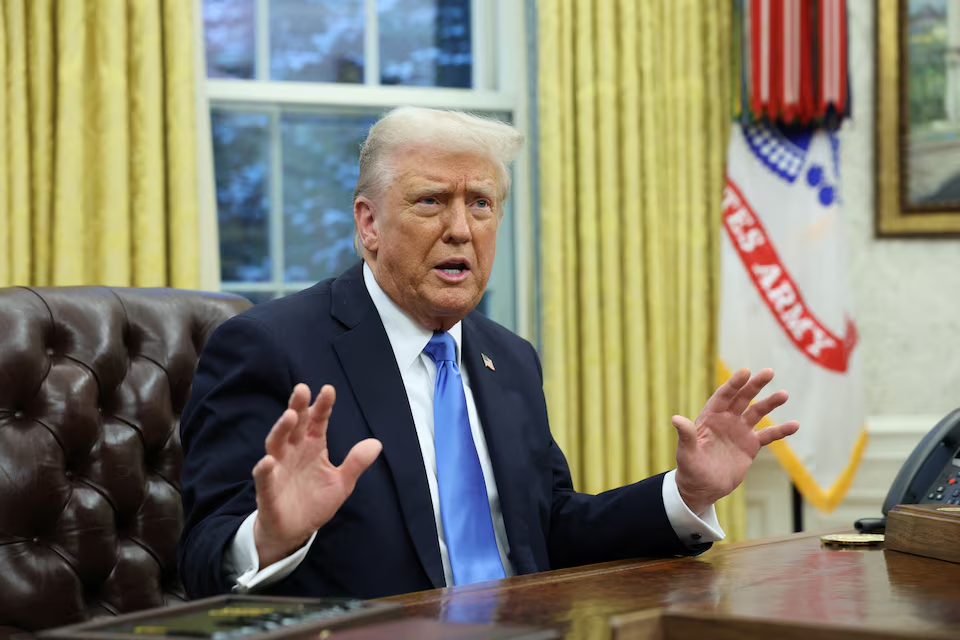News
Trump Confirms CIA Operation in Venezuela, Intensifying Pressure on Maduro

U.S. President Donald Trump confirmed on Wednesday that he has authorized the Central Intelligence Agency to conduct covert operations in Venezuela, escalating Washington’s efforts to pressure President Nicolás Maduro’s government.
The New York Times first reported on the classified directive, citing U.S. officials familiar with the decision, which it said was part of a broader Trump administration strategy aimed at removing Maduro from power. The administration has already offered a $50 million reward for information leading to Maduro’s capture and conviction on drug trafficking charges.
According to the report, the new authorization allows the CIA to carry out “high-risk operations” inside Venezuela and across parts of the Caribbean.
When asked by reporters why he approved the CIA’s operations, Trump said the decision was driven by concerns over migration and drug trafficking.
“I actually approved it for two reasons,” Trump said in the Oval Office. “First, they emptied their prisons and sent them into the United States… they came through our open border. And second, drugs.”
Trump provided no evidence to support his claim that Venezuela is sending former prisoners to the United States.
He added that the U.S. had made progress in intercepting drug shipments at sea and that new efforts were now focusing on land routes.
“We’ve got the seas very much under control,” he said. Reuters could not independently verify what specific operations Trump had approved, and the White House declined to elaborate.
Historically, CIA involvement in such missions has ranged from direct paramilitary engagement to intelligence gathering and support roles, often with minimal physical footprint.
The agency has a long history of operations in Latin America, particularly during the Cold War, and played a role in dismantling parts of South America’s cocaine networks in the late 20th century. Reuters has previously reported that the CIA has operated secret missions in Mexico to track the country’s most-wanted drug traffickers.
Venezuela’s government condemned Trump’s remarks, calling them a violation of international law and accusing Washington of justifying a “regime-change operation” aimed at seizing the country’s oil resources.
Foreign Minister Yván Gil said on Telegram that Venezuela’s Permanent Mission to the United Nations would bring the matter before the Security Council and the Secretary-General, demanding accountability from the U.S. government.
“Our mission will file a formal complaint and call for U.S. accountability,” Gil said.
“Venezuela Is Feeling the Heat”
Trump has repeatedly accused Venezuela of being a hub for fentanyl trafficking, though U.S. records indicate that Mexico is the main source.
Asked why the U.S. Coast Guard was not intercepting suspected drug-smuggling vessels—a long-standing practice—Trump dismissed such efforts as “politically correct” and ineffective.
When asked whether the CIA was authorized to assassinate Maduro, Trump declined to answer, saying only:
“I think Venezuela is feeling the heat.”
Trump has also ordered a major U.S. military buildup in the southern Caribbean, where forces have launched at least five strikes against vessels the administration claimed were involved in drug trafficking—none of which have been independently verified.
The campaign marks the latest example of Trump deploying U.S. military power in novel and legally contentious ways, ranging from sending active-duty troops to Los Angeles to carrying out counterterrorism-style strikes against alleged drug traffickers.
Recently, the Pentagon told Congress that Trump had determined the U.S. was engaged in a “non-international armed conflict” with drug cartels.
Trump further alleged that Venezuela had released “large numbers of prisoners,” including individuals from mental health facilities, into the U.S., though he did not specify how they entered.
Neither Venezuela’s Information Ministry nor opposition leader María Corina Machado’s spokesperson immediately responded to requests for comment.
Members of Congress, including some Republicans, have criticized the administration’s lack of transparency about the operations.
Senator Jeanne Shaheen, the top Democrat on the Senate Foreign Relations Committee, said on Wednesday that the administration’s actions had brought the U.S. “dangerously close to direct conflict.”
“The American people deserve to know if this administration is leading us into another war, putting service members at risk, or pursuing a regime-change operation,” Shaheen said in a statement.
